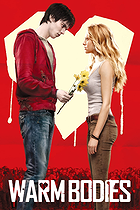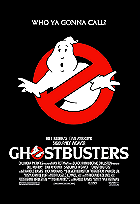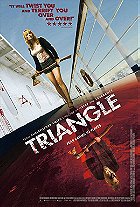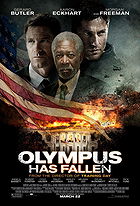According to Marlon Wayans, A Haunted House is not exactly a parody but instead a horror flick with "funny characters" doing the opposite of what typical white people do in similar movies. I call bullshit: this is a spoof film, plain and simple, constructed in a way that brings back painful memories of such Friedberg/Seltzer catastrophes as Disaster Movie and Meet the Spartans. There are maybe three or four amusing moments in this entire film - as for the rest, A Haunted House is a banal endurance test, an early contender for one of 2013's worst movies. The best thing that can be said for the film is that it's an R-rated comedy, unlike Scary Movie 5, but that's about the only shred of positivity I can offer.

Taking its cues from the Paranormal Activity franchise and 2012's The Devil Inside, the plot concerns Malcolm (Wayans), who moves in with girlfriend Kisha (Essence Atkins) in the suburbs. Malcolm purchases a video camera to document every facet of their new life together. He even sets up a camera at night overlooking their bed to film their bedroom Olympics. Kisha suspects that their housekeeper may be stealing from them, so they also install some surveillance cameras around their home. But Malcolm's cameras capture evidence that a ghostly presence may be in the house, compelling the pair to call upon a psychic (Nick Swardson), a pair of ghost hunters (David Koechner and Dave Sheridan), and a coke-snorting priest (Cedric the Entertainer).
Wayans was working without any of his brothers here, but he still retains all of the recognisable trademarks of a Wayans production: stupid, unfunny jokes about farts, poop, sex, dicks and masturbation. The material grows increasingly limp and uncreative the more it chugs along, with racism and ghost-rape also popping up. In the right hands, just about anything can be funny, but director Michael Tiddes is not the right hands. As a matter of fact, nobody involved in creating A Haunted House constitutes the right hands. Hence, if you have the mental capacity of a ten-year-old, this sophomoric effort may be to your liking. But the rest of us will see A Haunted House to be the pile of shit that it is. Gags run on for far too long, with Malcolm at one stage engaging in sexual acts with stuffed toys for several minutes. Other jokes are simply repeated to exhaustion - the psychic is gay and tries to cajole Malcolm into being his lover, which is not funny the first or second time, let alone the twentieth. The film eventually starts spoofing The Devil Inside and The Rite, apparently forgetting that audiences found those movies to be hilarious self-parodies in the first place.

There is only one scene in A Haunted House that made me laugh out loud. After Malcolm witnesses compelling evidence that a poltergeist is indeed inside his residence, he immediately flees the house, packing up his gear and tearing off to safety, leaving Kisha behind. But he soon realises that it's impossible to sell a home in today's wretched market and is subsequently forced to move back in. It's such a clever concept amid the scenes of gross-out gags, gay jokes and drug-taking, and it's executed with unexpected precision and comedic gusto. It's so on the money, in fact, that I'm convinced it was created by an entirely different creative team from the rest of the movie. What a shame this goodness lasts for about a minute. There may be a few other amusing lines here and there, but A Haunted House is slim pickings for the most part. If all the worthwhile jokes from this ninety-minute film were edited down into one bite-sized chunk, we'd be left with barely five minutes.
A Haunted House is not worth your time. There's absolutely no subtlety, wittiness or sense of pacing here. It doesn't even feel like a real movie. Compare A Haunted House to something like Ghostbusters or The Naked Gun, and the difference is day and night; whereas the aforementioned '80s comedies have stories to tell and were brought to life via creative scripts and actual filmmaking artists, A Haunted House is a limp "comedy" assembled by self-indulgent filmmakers. This was Tiddes' first movie, and you can tell; it feels more like a student project than a proper theatrical production. Unfortunately, it turned a profit, earning in excess of $40 million from a $2 million budget. A Haunted House 2 is coming, a sure sign of the apocalypse.
2.2/10
 Login
Login
 Home
Home 183 Lists
183 Lists 1668 Reviews
1668 Reviews Collections
Collections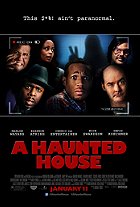
 0 comments,
0 comments, 